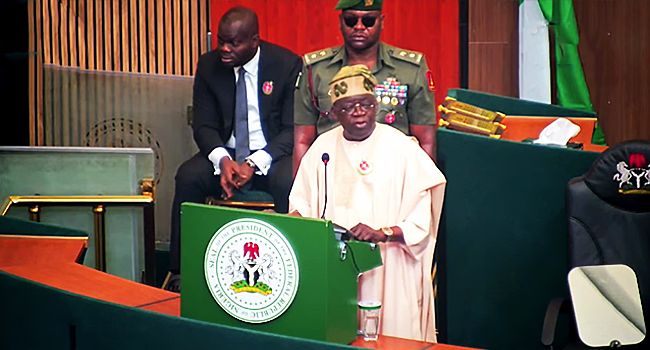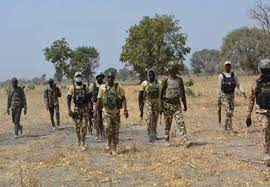
In a significant move aimed at revitalizing Nigeria’s economy and securing its future, President Bola Tinubu presented the 2025 National Budget Proposal before a joint session of the National Assembly on Wednesday. The N47.9 trillion budget, which the President dubbed “The Resurrection Budget,” is a blueprint designed to address the nation’s most pressing challenges security, infrastructure, health, education and to set the stage for long-term prosperity.
In his address, delivered after 1:00 PM, Tinubu outlined an ambitious fiscal plan that he believes will stabilize the economy, create jobs, and foster inclusive growth. The President framed the budget as a crucial step toward restoring Nigeria’s macroeconomic stability, enhancing the business environment, and improving the living standards of millions of Nigerians. “This budget is not just a document of numbers. It’s a call to action—an action to heal the wounds of the past and lay the foundation for a prosperous future,” Tinubu stated.
Prioritizing Key Sectors
The 2025 budget proposes significant investments in critical sectors to address the country’s most immediate needs. Among the largest allocations are:
- Defence and Security: N4.91 trillion
- Infrastructure: N4.06 trillion
- Health: N2.4 trillion
- Education: N3.5 trillion
These allocations reflect the administration’s recognition that national security, human capital development, and infrastructure are pivotal to Nigeria’s growth. The President underscored that restoring security is essential for the realization of other developmental goals, stating, “A secure environment is the bedrock of any nation’s prosperity. We must invest in our safety and peace.”
Infrastructure, health, and education also received significant attention. With the country’s infrastructure in dire need of expansion and modernization, Tinubu’s focus on boosting investments in roads, energy, and transportation is a response to the nation’s chronic infrastructural deficits. In health and education, the President’s administration aims to enhance access and quality, addressing the twin challenges of poor healthcare and educational outcomes that have hindered the country’s development for decades.
A Bold Fiscal Plan
The budget proposal projects a total revenue of N34.8 trillion, which would finance the N47.9 trillion expenditure. Debt servicing, as expected, takes a significant chunk, with N15.81 trillion earmarked for this purpose. This points to Nigeria’s ongoing struggle with its rising debt burden, though the government insists that the fiscal plan is both necessary and sustainable.
The projected budget deficit of N13 trillion, equivalent to 3.89% of GDP, highlights the financial gap between revenue and expenditure. The government has defended this deficit, arguing that it is a reasonable and critical investment to secure the country’s future. Despite the deficit, Tinubu emphasized that the government would continue its commitment to economic reforms and fiscal discipline, insisting that the goal is not just to spend but to invest strategically in the future of Nigeria.
Inflation and the exchange rate are also key areas of focus in the 2025 budget. With inflation currently hovering at a staggering 34.6%, the President set an ambitious target to reduce it to 15% by the end of next year. The exchange rate is also projected to improve, with the naira expected to strengthen from N1,700 to N1,500 per US dollar. These targets are optimistic but necessary, considering Nigeria’s ongoing economic challenges.
Crude Oil Production Target
In terms of revenue generation, Tinubu’s government is pinning a significant portion of its economic growth on oil production. The 2025 budget projects that Nigeria will produce 2.06 million barrels of oil per day, a critical target given that crude oil exports still form the backbone of the nation’s revenue base. With the global energy market constantly shifting, achieving this target will depend heavily on stabilizing the country’s oil production, which has faced numerous challenges in recent years due to both internal and external factors.
A Call for Collective Action
In his speech, President Tinubu made it clear that the 2025 budget is not merely a set of fiscal projections but a rallying cry for national transformation. “The time for lamentation is over. The time to act is now,” he declared, urging lawmakers to support the budget and the reforms it represents. He also spoke of the existential threats posed by corruption and insecurity, calling on all Nigerians to unite in the fight to overcome these challenges.
“Corruption and insecurity are our greatest enemies, and they will not be allowed to dictate the future of our nation,” he said. “But these challenges are surmountable. We must come together as a people and rewrite the narrative of our country.”
The President’s commitment to food security was another cornerstone of his address. He made it clear that the government would prioritize policies that ensure Nigerians have enough to eat and do not go to bed hungry. This is particularly important given the high levels of poverty and food insecurity in various parts of the country.
Looking Ahead: Economic Renewal
The President concluded his speech by expressing confidence in the trajectory of Nigeria’s economic renewal. “The reforms are already yielding results. There will be no turning back,” he affirmed. While acknowledging the challenges ahead, he remained optimistic that the 2025 budget, with its bold fiscal measures and strategic investments, would drive the country towards long-term stability and prosperity.
Despite the complexity and challenges inherent in such an ambitious budget, the government believes that these plans are essential for securing a brighter future for Nigeria. “This is our moment,” Tinubu said. “The time to act, the time to build, is now.”
The presentation, which was initially scheduled for Tuesday, was postponed after a meeting of the Federal Executive Council (FEC) earlier in the week. Tinubu was accompanied by key government officials, including the Secretary to the Government of the Federation, George Akume, and Chief of Staff to the President, Femi Gbajabiamila, as they ushered in what is seen as a transformative phase for Nigeria’s economic and national development.





